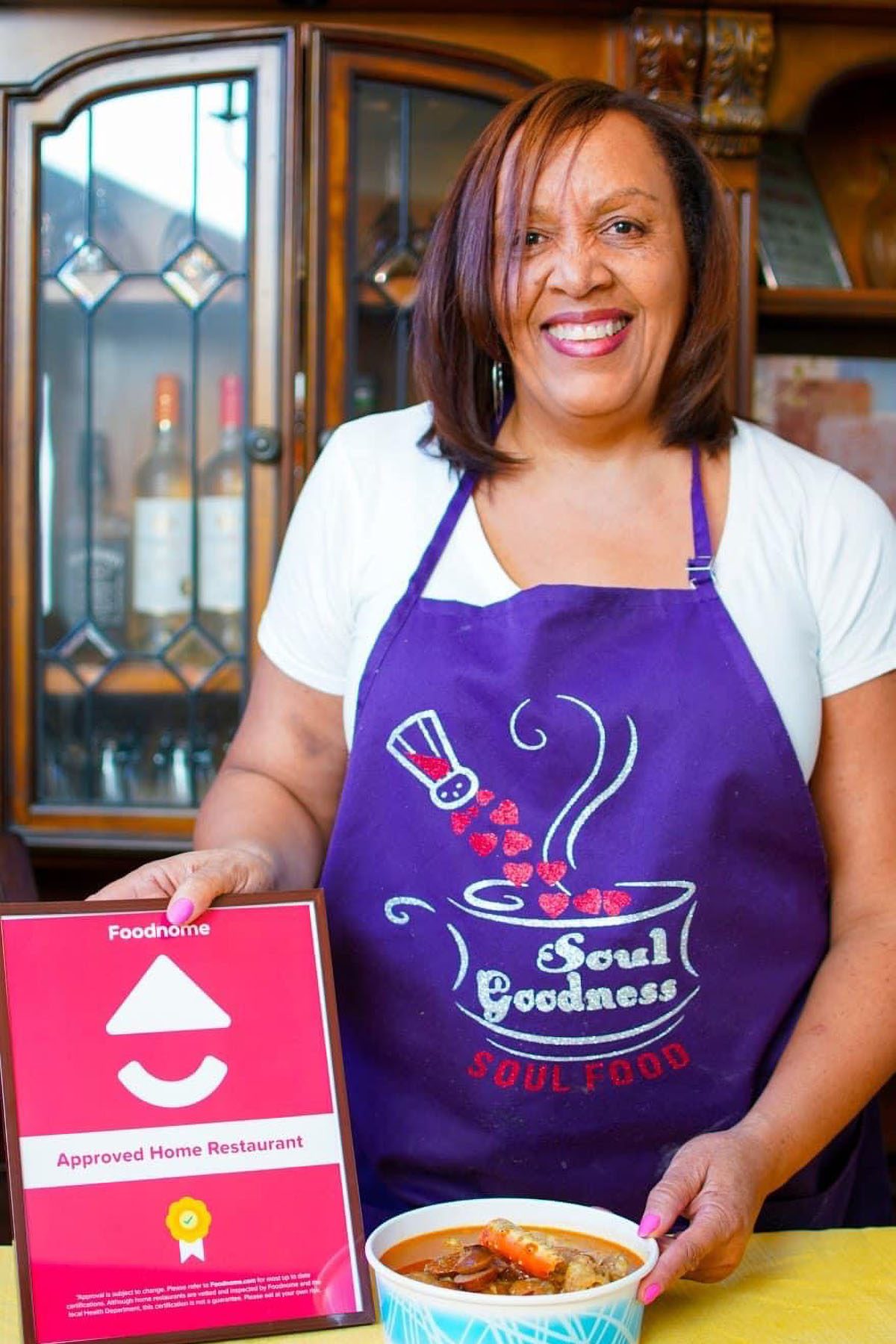At-home Businesses Are Growing. Women and People of Color Benefit the Most

iStock.com/Poike

Connecting state and local government leaders
The pandemic has fueled the passage of new ordinances in cities and states allowing entrepreneurs to set up businesses from home — a boon for women and people of color who face systemic barriers.
Originally published by The 19th
In August 2020, on a quiet residential street in the Phinney Ridge neighborhood of Seattle, a tiny emerald bar suddenly appeared inside a converted garage facing the road.
It drew the neighborhood, with families walking to pick up four-packs of cider to-go, grab lollipops for their kids or treats for their dogs, and talk to the owner, a woman who had turned her passion project into reality just as the world was shutting down.
Caitlin Braam’s Yonder Cider, a business she and her husband, Jon, had poured their savings into to start, launched just before the pandemic without a physical space yet, but before long, she had realized it could slip away entirely. So she opened up at the only place she could: home.
The city had closed the street by Braam’s house to cars, and, with many of the businesses on the main road in their neighborhood also closed, her street became the busiest in the area just as people were spending months cooped up at home, creating a customer base at their doorstep in mere weeks. It was not the taproom they had dreamed of, but it was close enough.
“We became this kind of neighborhood spot, not just for cider but for a friendly face,” Braam said.
Then the complaints started to come in.
One resident didn’t like the bar’s proximity to a nearby school, so he started to pepper the city with calls. In Seattle, you must be able to fit your car inside the garage, and residences can’t look like a business from the outside or have signage larger than a sheet of copy paper. The city threatened to close Yonder Bar.
But the neighborhood rallied around Braam, who collected 5,000 signatures in a petition and took her case to the city council to persuade them to change the rules so that at-home businesses like hers could have an opportunity to thrive, especially at a time when the economy was in shambles.
The city decided to hear Braam’s case—and agreed with her. In March 2021, Seattle passed a one-year change of its land-use code to eliminate the car-in-the-garage requirement and allow one non-illuminated sign with a business’ name.
For business owners like her, those moves signify opportunity, Braam said.
“It allows businesses … to check the viability of their business and make sure it’s going to work, and that people actually want it,” Braam said.
A wave of new rules in cities, counties and states during the pandemic is opening avenues to entrepreneurship by allowing more people to open businesses at home. Women and people of color, who typically face systemic barriers to starting a business and who have been hit hardest by pandemic job losses, stand to gain the most.
The option to start a business might have been out of reach for many women and people of color before. A study by the Small Business Administration found that businesses owned by people of color are more likely to be financially constrained and more likely to have their loan applications denied. Women face similar barriers, with only 2 to 3 percent of venture capital funds going to women entrepreneurs. Lack of institutional wealth or support and existing banking relationships make it difficult for marginalized communities to set up businesses in commercial spaces.
That’s why the easing of at-home regulations across the country—from California to Montana to New Jersey—could lower or remove some of those hurdles.
Historically, the majority of at-home businesses are owned by women or are equally owned by a man and a woman — 89 percent, according to data from the Institute for Justice, a libertarian group that has been at the forefront of lawsuits to roll back at-home business regulations.
The changes have been motivated by a desire to give entrepreneurs more flexibility to generate economic activity and as a response to changing needs during the pandemic. In some cases, it was specifically designed to ease barriers for women and people of color. Chicago Alderman Gilbert Villegas sponsored a successful measure to relax rules around how much of their home people could use toward their business, saying he hoped it would “primarily help minority-owned and female-owned businesses in Chicago.”
Already, there’s evidence that the changing regulations are leading to more women starting businesses. The number of businesses owned by women grew 27 percent during the pandemic, compared with 17 percent for men and 17 percent for nonbinary people, according to an analysis by LinkedIn. A Pew Research analysis found that the number of women who became self-employed grew by 4.3 percent from 2019 to 2021. For men, the number had dropped by 1 percent in that time period. The data does not reflect nonbinary people.
“So many people, including our lawmakers and policymakers, were working from home, teaching their children from home — everything was happening at home,” said Beth Kregor, the director of the Institute for Justice Clinic on Entrepreneurship at the University of Chicago Law School. “And to turn around and say someone who’s got her own business isn’t allowed to work from home, even though people who were working for big companies were working from home, just became clear to be patently absurd.”
The changing regulations have come in the form of altered land codes to allow people to have customers in their home, use more of their homes for their businesses and sell homemade foods—known as “cottage food”—without having to set up a commercial kitchen. About 83 percent of cottage food producers are women, according to data from the Institute for Justice.
Those changes have allowed business owners to test side hustles and show proof of concept, all elements that are key in helping them secure financing once their businesses are up and running. It’s a mechanism to close the wealth gap, said Carolina Martinez, the CEO of California Association for Micro Enterprise Opportunity, a group that represents and supports businesses with one to five employees.
“The challenge underserved communities have is they don’t have a lot of money to just invest and get started and then try to see if it works,” Martinez said. “This allows them to cut that investment initially and then can really prove to any lender that, ‘Yes, I’ve been selling, people like it, I’ve been increasing my sales by X percentage, and I actually need the capital to move it to the next level.’”
Martinez, whose organization works with largely at-home cooks, said the number of new businesses that have joined their ranks has grown by more than 25 percent during the pandemic, almost all of it driven by sole proprietors from underserved communities.
For women, in particular, who are more likely to face caregiving responsibilities for young children or ailing family members, the flexibility of an at-home business helps them continue to earn an income. During the pandemic, hundreds of thousands of women left the labor force specifically because their jobs did not allow them to provide care and work at the same time.
Denise Blackmon, a home cook in Moreno Valley, California, had trouble holding down a job because of the care needs of her 27-year-old son who has autism. Employers would promise to work with her schedule, which sometimes required her missing entire days for therapy and doctor’s appointments, only to later let her go. She drove for Uber for nearly two years to try to patch together enough to live, but she was earning only a couple hundred dollars a week.
When Riverside County, where Blackmon lives, became among the first to ease its cottage food regulations just before the pandemic, her entire financial landscape shifted. Blackmon became the first in her county to be licensed to operate her business, Soul Goodness Home Restaurant, out of her home.
Now, she earns nearly three times more on just one of the dishes she cooks a week—a soul food oxtail recipe—than she did driving for Uber.
“It just lifted stress I didn’t realize I had,” said Blackmon, 58. “And the benefits of it—I can’t even begin to explain the good it’s done for me. Being stuck in a house with a child with autism, it’s very isolating at times, so this opens up the door where I do get to basically socialize again.”
Before it became an option in California, she said the idea of opening a restaurant had not even crossed her mind. She certainly didn’t have the money to do it, and so she thought about her small hobby, cooking dishes for friends, as just that.

But now her business is thriving. Blackmon doesn’t have dreams of opening a brick and mortar version of Soul Goodness—this model works for her, she said. People recognize her around town, she said, and during the pandemic, she could advertise that she was the only cook handling customers’ food at a time when people avoided restaurants over fears of who had touched their food. Blackmon noted that she also gets inspected just like other restaurants and went through an intensive inspection process when she was first setting up her business in 2019.
Historically, many at-home regulations were rooted in racist policies. In the early 20th century, restrictions started to crop up to keep work and life separate, with larger zoning regulations created in some areas of the country to restrict blue-collar trades—butchers, barbers, laundries, the kinds of jobs performed by former slaves or immigrants—out of residential neighborhoods, said Joshua Windham, an attorney at the Institute for Justice.
Changing the approach to at-home business regulations can undo some of the discriminatory practices that arose from that initial legislation. Because city code enforcement boards are typically small, they rely on complaints to enforce rules. That system has opened opportunities for people to target entrepreneurs of color, having a chilling effect on those who even attempted to start businesses.
Take segregated Chicago, Kregor noted. A recent study found that cyclists in predominantly Black communities were eight times more likely to be ticketed by police for riding their bikes on the sidewalk. At-home business regulations work in a similar way in that racial bias can play a role in who is getting penalized and who isn’t. So many of the rules are also confusing to navigate, Kregor said, causing people to be hesitant about starting a business to avoid any potential fines or interactions with police.
“When the rules on the books are really strict but not vigorously enforced, you have to wonder whether all the enforcement is going to be in neighborhoods or against people who are under-resourced,” Kregor said.
In Chicago, where Kregor has been part of a group advocating to ease at-home regulations for over a decade, new rules passed this year would increase how much of a person’s home they could use for their business. Previously, people could only use 10 percent of their home, something Kregor argued was making it more difficult for low-income people who lived in smaller, more cramped quarters, leaving them with little space to operate their businesses.
The new law changes the percentage to 25 percent or 300 square feet, whichever is larger. A law passed in Illinois this year will allow bakers to sell food from home beginning in 2022, with some exceptions for meats, poultry and seafood. That means people don’t need to spend several thousand dollars setting up a commercial kitchen or renting space and can keep economic activity in their own neighborhoods, Kregor said.
“If that person’s living in a neighborhood that’s a bit of a retail desert or food desert … there’s really no place for them to go where they can afford to rent a commercial kitchen near home,” Kregor said. “The barriers just add up to one another—it’s harder for them to get to other neighborhoods, it’s harder for them to make the investment in their own neighborhood because it’s a little riskier.”
As the economic recovery continues to shakily churn toward a pre-pandemic world, Martinez said that a change to these laws will help the people who are struggling the most to stay afloat financially.
“It’s not only for them, it’s for their families,” she said. “That will really be supporting the recovery at the same time.”
That’s exactly what happened in Seattle after Braam successfully got the city to put the eased restrictions into effect through March 2022. The bill was designed to give businesses a head start, with the goal that they would be able to find commercial space and transition out of their homes a year later.
In September, Braam was able to open Yonder Bar in a larger taproom space as part of a partnership with a distillery. The new commercial space allowed her to grow her business from just a few employees to 10. A couple other businesses have started since the law was passed—including a floral shop and a plant shop, both owned by women of color.
“A lot of people during the pandemic took a really close look at what they were doing—with their lives, with their jobs, with their family—and a lot of people took time to hone their passions and their creativity,” Braam said. “To be able to then incubate within your home and build that passion into potentially a business is really an opportunity for people to thrive and to take down a lot of the barriers that exist to taking that first jump.”
Chabeli Carrazana is an economy reporter at the 19th.

NEXT STORY: Governor Declares State of Emergency Due to Covid Surge



